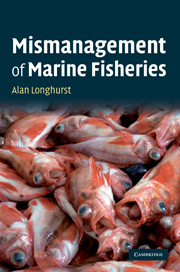Book contents
- Frontmatter
- Contents
- Preface
- 1 From certainty to doubt in fishery science
- 2 The ecological consequences of the exceptional fecundity of teleosts
- 3 Indeterminate growth, negative senescence and longevity
- 4 Marine ecosystems: their structure and simulation
- 5 The natural variability of fish populations and fisheries
- 6 Has sustainability in fishing ever been achieved?
- 7 What is the real state of global fish populations?
- 8 The mechanics of population collapse
- 9 Why don't some fish populations recover after depletion?
- 10 Is the response of the fishery science community appropriate?
- 11 Conclusion: sustainability can be achieved rarely and only under special conditions
- Index
11 - Conclusion: sustainability can be achieved rarely and only under special conditions
Published online by Cambridge University Press: 05 July 2014
- Frontmatter
- Contents
- Preface
- 1 From certainty to doubt in fishery science
- 2 The ecological consequences of the exceptional fecundity of teleosts
- 3 Indeterminate growth, negative senescence and longevity
- 4 Marine ecosystems: their structure and simulation
- 5 The natural variability of fish populations and fisheries
- 6 Has sustainability in fishing ever been achieved?
- 7 What is the real state of global fish populations?
- 8 The mechanics of population collapse
- 9 Why don't some fish populations recover after depletion?
- 10 Is the response of the fishery science community appropriate?
- 11 Conclusion: sustainability can be achieved rarely and only under special conditions
- Index
Summary
‘A traveller bought a little fish and gave it to his inn-keeper to prepare; asked if he had cheese and vinegar and olive oil, the traveller replied that if he had those things he would not have bought the fish . . .’
Plutarch on The Eating of FleshDoes anything in the previous chapters provide what we are looking for – a mechanism that supports the assumption that marine ecosystems are able to ‘produce a surplus that we can share, year for year’, provided always that they are not excessively transformed by fishing or some other activity?
What most strongly supports this thesis is the characteristic biology of teleost fish, which are very remarkable organisms, because of the interaction between a reproductive mechanism that is unique among vertebrates and lifelong, indeterminate growth. Although the significance of their very high fecundity for sustaining fisheries may have been misinterpreted in the past, the biology of those teleost fish that adopt a ‘fecundity’, rather than a ‘bestowal’, reproductive strategy may be essential in maintaining populations of large predatory fish in cold seas with high primary production but a very low diversity of other fish species: as discussed in Chapter 2, this reproductive strategy of teleosts may be the essential ingredient in our great northern fisheries.
Because their relative fecundity increases progressively throughout life after maturity, a depleted adult population of teleosts may be able to increase more rapidly in numbers of individuals when external conditions change for the better than could, for instance, a depleted population of terrestrial mammals.
- Type
- Chapter
- Information
- Mismanagement of Marine Fisheries , pp. 291 - 314Publisher: Cambridge University PressPrint publication year: 2010



